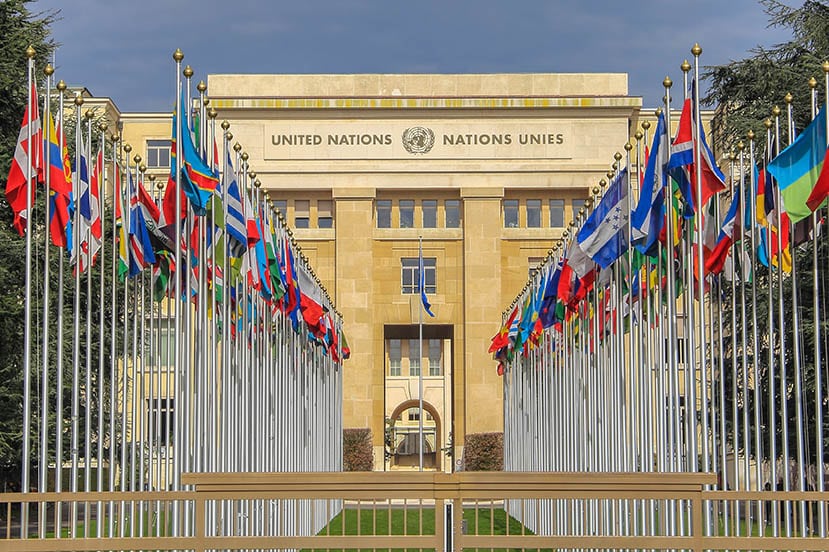
The latest draft, called a “non-paper,” was released by Luis Vayas Valdivieso, chair of the Intergovernmental Negotiating Committee on Plastic Pollution, convened by the United Nations. | Bascar/Shutterstock
A new draft of the U.N.’s global treaty on plastics has sparked disappointment from environmental groups after leaving some of the most contentious issues unaddressed.
The draft, called a “non-paper” because it is a working suggestion, was released by Luis Vayas Valdivieso, chair of the Intergovernmental Negotiating Committee on Plastic Pollution, convened by the United Nations. Vayas noted in the document that the goal is to “assist our collective efforts to negotiate a legally binding instrument on plastic pollution” at the upcoming INC-5 in Busan, Korea, from Nov. 25 through Dec. 1.
“I present this non-paper on the understanding that the approach I have been working with to advance discussions is an acceptable basis for further work, bearing in mind the broadly shared view that there is a need to focus the text on essential elements, make the best use of the seven days remaining at INC-5 to conclude our negotiations, and ensure that the treaty is effective, implementable and fit for the purpose of ending plastic pollution,” he added.
The last meeting, INC-4, ended with general agreement on the need for global rules and mandates on product design, composition, performance and extended producer responsibility. INC-5 is the last chance the delegates have to meet the voted-upon deadline of having a treaty by the end of 2024.
In the non-paper, Vayas suggested combining the two suggested objectives of this convention: “to protect human health and the environment from the adverse impacts of plastics, with the ambition of ending plastic pollution, including in the marine environment.”
However, when it comes to eliminating some plastic products and some “chemicals of concern” in plastic products, Vayas said he had not “detected sufficient convergence to suggest draft text.”
He noted that countries have different legal and administrative structures and national circumstances, so flexibility is needed. The non-paper suggested making an initial list of plastic products “to be controlled,” with exclusions and exceptions. It also suggested a list of measures that could be applied to plastic products and a process for the Conference of the Parties to identify further plastic products and chemicals of concern and phase them out.
The non-paper puts forward draft text on the exemption application process, how to encourage design for recyclability and for plastic alternatives, emissions and releases, a just transition, cleaning up existing pollution, technology support, implementation and compliance, the creation of national plans, reporting, evaluation and monitoring, education, information exchange and dispute resolution.
Vayas did not provide suggested text for the section on supply of plastics, including recycled resin, instead noting: “I propose that INC-5 agrees on text that includes a process to address the current information gaps regarding existing and needed levels of production, as well as the lack of clarity about efficiency and effectiveness in recovering plastic polymers.” He also did not suggest a financial mechanism.
When it comes to management of plastics, the non-paper suggested that each country “take measures, including, where relevant, through a sectoral approach, to ensure that plastic waste is managed in an environmentally sound manner.” It included a list of additional measures that countries could take if they wish, including encouraging and investing in recycling systems.
As for existing plastic pollution, Vayas proposed text that says countries shall cooperate to identify, evaluate and prioritize locations or accumulation zones most affected by existing plastic pollution and “take mitigation and remediation measures, including clean-up activities in such identified affected locations or accumulation zones.”
Vayas proposed a 17-member committee to review compliance and proposed that the first evaluation of the effectiveness of the treaty happen no later than six years after it is implemented.
In a statement, Ocean Conservancy’s Nicholas Mallos, vice president of the ocean plastics program, said that “what we saw in the non-paper is disappointing and frankly an embarrassment for every single organization, member state and delegation that has worked tirelessly over nearly three years to negotiate an ambitious agreement.”
He added that the “ambition that we all dreamed and spoke of in earlier negotiations is absent from this new document.”
With no mention of abandoned fishing gear left in oceans – known as ghost gear – and plastic reduction “taken off the table,” Mallos said the draft “woefully misses the mark.”
“There’s still time to right the ship,” he added. “We stand ready to support the Chair and member states in shaping a stronger, more impactful agreement. We urge every delegate going to Busan in November to spend the next few weeks seizing back the gains we made, so we can meet the plastics pollution crisis with the urgency and ambition it demands.”
Similarly, the World Wildlife Fund called the document “lacking in core measures that would make the resulting treaty fit for purpose,” according to a statement from the organization.
“While the ‘non-paper’ provides a clearer and cleaner starting point for negotiations than the unwieldy 70-page draft produced at INC-4, WWF cautions that significant gaps remain that negotiators must immediately rectify,” the statement added.
Those gaps include the lack of explicit text to ban or phase out some plastic products and a lack of clarity on whether product design requirements will be mandatory.
The attorney generals of 10 U.S. states – New York, California, Connecticut, Delaware, Hawaii, Maryland, Massachusetts, New Jersey, Pennsylvania and Vermont – recently called on the U.S. delegation to work toward a stronger treaty.
A version of this story appeared in Plastics Recycling Update on Nov. 6.